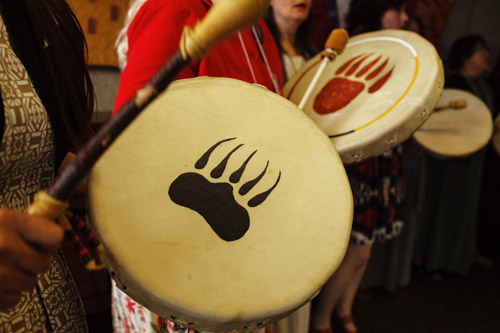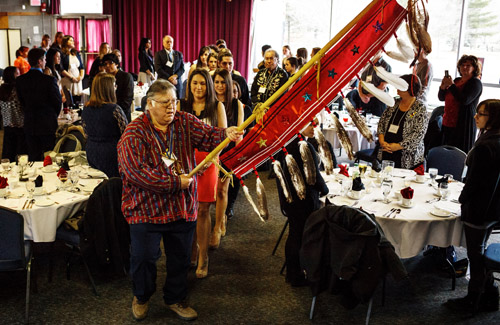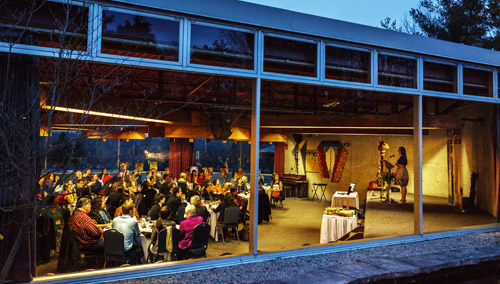
Ten years ago, there were 68 students at U of G who identified themselves as aboriginals to the newly established Aboriginal Student Association. By contrast, there were nearly 400 aboriginal students registered for the University’s fall 2012 semester, and the student association is celebrating 10 years of success in supporting and engaging aboriginal students on campus.
In April 2003, a group of First Nations and Métis staff, students and community members met with University administrators to share ideas about how to support U of G’s aboriginal students. One of those students was Cara Wehkamp, now manager of the Aboriginal Resource Centre (ARC). As a result of those discussions, the centre was opened in October 2003 to provide a meeting place on campus for aboriginal students.
ARC’s first manager and U of G’s first aboriginal student adviser was Jaime Mishibinijima; when she left campus two years ago, Wehkamp took up the position at ARC.
The centre kicked off its 10th anniversary celebration last month at its annual dinner and celebration of aboriginal achievement.
The celebration is an opportunity to showcase the accomplishments of U of G’s aboriginal students. “Aboriginal youth take up post-secondary education at lower rates than the rest of the population,” explains Wehkamp. “There are not many role models for them. Events like our celebration show them that, in fact, there are many aboriginal students in post-secondary education and alumni who are accomplishing important things.”
The event was attended by almost 100 people and was opened by Dan Smoke, one of the elders who often works with students at ARC. Wehkamp says he carried his eagle staff at the head of a grand entry of alumni and graduating students.

Later in the evening, Mackenzie Lespérance, an M.Sc. student in plant agriculture, was presented with the Kishaadigeh Award. This award was created in honour of Mishibinijima (now Jaime Cidro) for her role in guiding ARC. In Ojibway, the award’s name means “she who guards the lodge.”
Lespérance was described to those in attendance as “taking responsibility to sit with elders with respect and openness as she strives to understand herself and her impact on others as integral aspects of her personal growth. In addition to being passionate and taking responsibility for her own learning, Mackenzie acts as a role model for and encourages other aboriginal students to become involved in learning more about their people.”
Cidro was keynote speaker for the evening. She received a PhD in rural studies from U of G and is now an assistant professor at the University of Winnipeg in its department of anthropology.
Like Cidro, Wehkamp stresses the value of the resource centre in helping students. “Our tagline is ‘your home away from home,’” Wehkamp says. “We want this to be a place where aboriginal students are comfortable being themselves as they explore or maintain their cultural traditions.”
She points out that education has not always had positive connotations in aboriginal communities because of past practices of removing children from their homes to attend schools where their traditions and culture were rejected. She says it’s important not only for U of G students to have this support, but for the wider community to see that aboriginal culture is acknowledged and shared through ARC.
“This is a place for the community to experience aboriginal traditions and to learn about them in an environment where we welcome open and respectful dialogue,” says Wehkamp.
The effectiveness of this approach is demonstrated by the increasing number of people using the centre: in 2009, about 300 people visited; so far in 2013, more than 2,300 students and community members have been involved.
“The elders are a significant part of what makes ARC successful,” Wehkamp adds. With their help, the centre is able to offer more programming, and the elders are valued resources for students and others, she says. “We have been very fortunate to have these people step forward and return year after year to engage with our students. The students often tell us that the elders remind them of their aunties or uncles or grandparents at home.”
ARC has also benefited from strong support from Student Affairs and the Aboriginal Advisory Council, which includes U of G alumni, University administrators, student representatives and aboriginal community members. The council meets three or four times annually to help provide direction and develop programming.
“When I was a student, the centre provided me with a lot of support,” says Wehkamp. “Now it has come full circle for me, and I am able to support the new students and see the success of our communities grow.”
